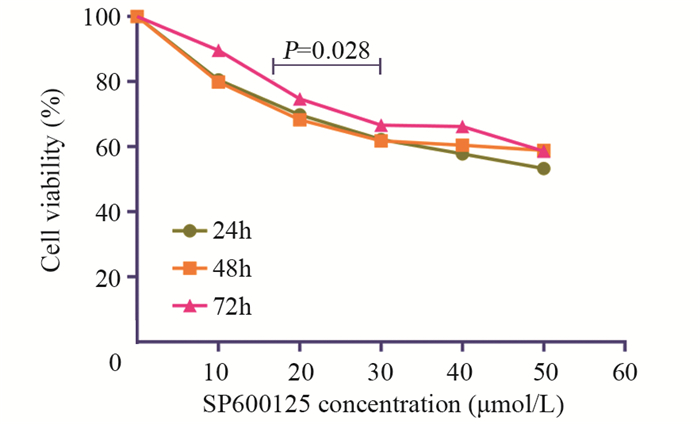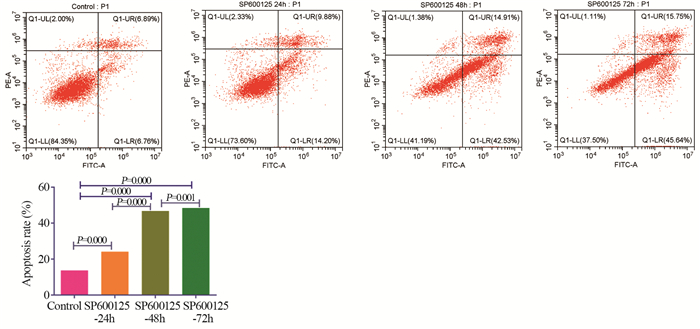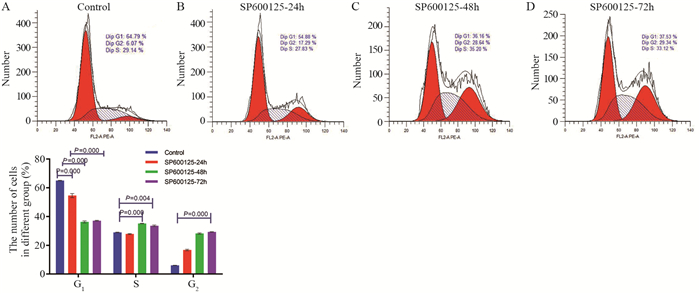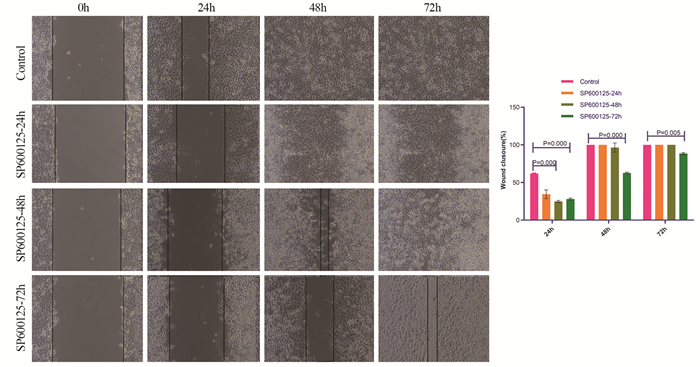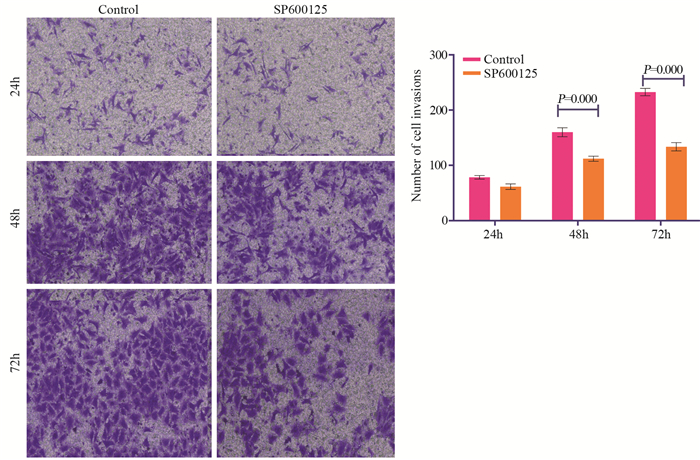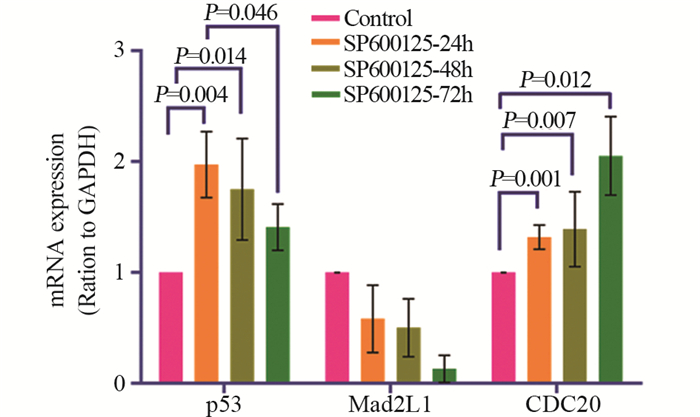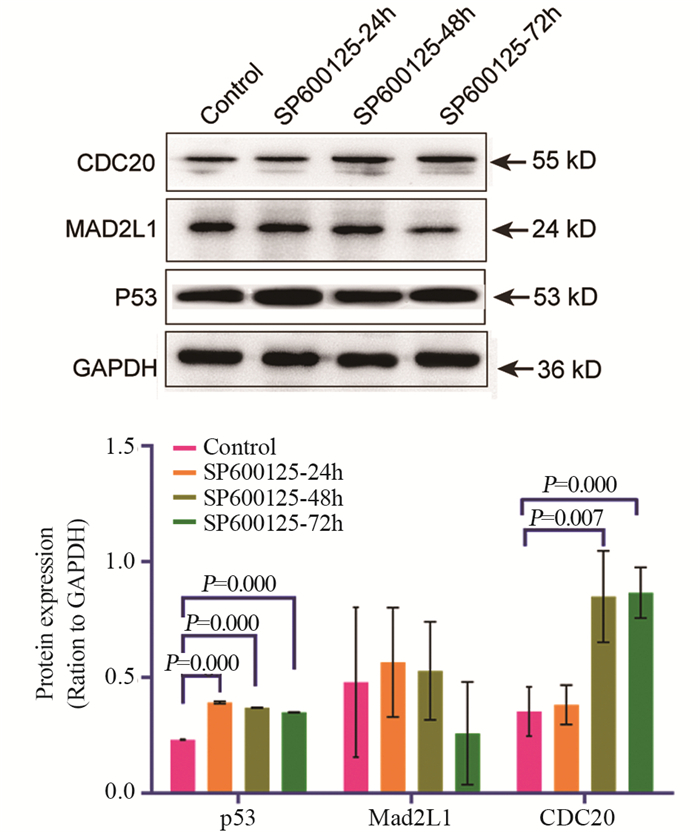Effects of SP600125 on Proliferation and Invasion of Human Cervical Cancer HeLa Cells
-
摘要:目的
探讨SP600125对人宫颈癌HeLa细胞的增殖周期、凋亡以及侵袭的影响。
方法采用CCK-8法检测不同时间点不同浓度的SP600125作用后HeLa细胞的增殖状态。确定20 μmol/L的SP600125用于后续实验。利用平板克隆形成实验检测细胞增殖能力,DAPI染色观察细胞核形态,流式细胞仪检测细胞周期和凋亡,细胞划痕和Transwell法检测细胞迁移和侵袭能力,qRT-PCR和Western blot分别检测SP600125作用不同时间点后各组细胞的p53、Mad2L1和CDC20 mRNA和蛋白水平的变化。
结果与对照组(0.1%DMSO)相比,10、20、30、40、50 μmol/L SP600125作用24 h均能使细胞的增殖活性降低。与对照组相比,各SP600125处理组的细胞凋亡率明显增加,且G2/M期细胞比例增加(P < 0.001),而SP600125处理HeLa细胞24和48 h的G0/G1期比例减少(P < 0.001),其细胞的克隆数、迁移和侵袭能力明显下降(P < 0.001);qRT-PCR和Western blot结果显示Mad2L1 mRNA和蛋白表达明显下降(P < 0.05),p53和CDC20 mRNA和蛋白则呈上升趋势(P < 0.01)。
结论SP600125可通过上调p53和CDC20以及下调Mad2L1的表达诱导宫颈癌HeLa细胞周期阻滞于G2/M期并促进细胞凋亡来抑制细胞的增殖、迁移和侵袭。
-
关键词:
- SP600125 /
- 人宫颈癌HeLa细胞 /
- Mad2L1 /
- CDC20
Abstract:ObjectiveTo investigate the effect of SP600125 on the proliferation, cell cycle, apoptosis and invasion of human cervical cancer HeLa cells.
MethodsCCK-8 method was used to detect the proliferation of HeLa cells treated with different concentrations of SP600125 at different time points. The 20 μmol/L of SP600125 was determined for subsequent experiments. Cell proliferation ability was detected using plate clone formation assay; nuclear morphology was observed by DAPI staining; cell cycle and apoptosis were measured by flow cytometry; cell migration and invasion were detected by cell scratch and Transwell methods; the mRNA and protein levels of p53, Mad2L1 and CDC20 were measured by qRT-PCR and Western blot after SP600125 treatment at different time points.
ResultsCompared with control group (0.1%DMSO), cells proliferative activity were reduced by 10, 20, 30, 40 and 50 μmol/L SP600125 treatment for 24h. Compared with control group, the rate of apoptosis was significantly increased in SP600125 treatment groups, and the cell proportion in G2/M phase increased (P < 0.001), while the cell proportion in G0/G1 phases cells was reduced after SP600125 treatment for 24h and 48h (P < 0.001), and the clonal number, migration and invasion ability of HeLa cells also decreased significantly (P < 0.001). qRT-PCR and Western blot results showed a significant decrease in Mad2L1 mRNA and protein expression (P < 0.05) and a significant increase in p53 and CDC20 mRNA and protein expression (P < 0.01).
ConclusionSP600125 can induce cell cycle arrest of cervical cancer HeLa cells in G2/M phase by upregulating p53 and CDC20 and downregulating Mad2L1 expression, and promote cell apoptosis to inhibit cell proliferation, migration and invasion.
-
Key words:
- SP600125 /
- Human cervical cancer HeLa cells /
- Mad2L1 /
- CDC20
-
0 引言
研究显示,中医药治疗恶性肿瘤药性温和,毒副作用小,具有“培元固本”“扶正祛邪”的特点[1-2]。现代药理研究证实,“扶正培元”方剂中很多核心药物除自身药理功效外,多药配合使用情况下还具有促进骨髓造血、提高免疫功能的效果,可起到较好抗癌的作用[3]。岐黄学者王平教授著有《元气论》,用调补元气法治疗恶性肿瘤,临床疗效满意。本研究以湖北省肿瘤医院运用中医药参与治疗肺癌的实证研究为基础,运用数据挖掘技术和网络药理学对中医药参与肺癌治疗用药规律进行分析,探索湖北省肿瘤医院治疗肺癌的中药用药规律。
1 资料与方法
1.1 患者一般情况
收集湖北省肿瘤医院2017年1月—2020年12月参与中医药治疗的3 234例肺癌住院患者的电子病案信息(门诊号、住院号、姓名、性别、年龄、疾病分期、发病时间、治疗方案、临床症状、体征、四诊信息、西医诊断、中药处方、剂型和剂量等)。3 234例肺癌患者中,男2 310例(71.43%),女924例(28.57%);年龄范围:10~88岁,平均年龄(59.02±9.92)岁,发病最多的年龄段为55~65岁,占总人数的35.19%。
1.2 诊断和纳入标准
诊断和治疗参照《中国临床肿瘤学会(CSCO)肺癌诊疗指南(2017.V1)》要求,病理诊断参照国际癌症机构(IARC)于2021年5月出版的《WHO胸部肿瘤分类(第5版)》[4],疾病分期诊断参照AJCC癌症分期手册。对湖北省肿瘤医院收治的诊断为肺癌患者的诊断和病例进行筛选。其中,处方纳入标准:入选方剂须是由3味以上中药组成;中药复方务必药味完全,药量准确,主治明确,疗效确实;因症状而作的加减用药,也纳入统计范畴内。排除精神病史或神经系统功能障碍,晚期危重症(含并发症)、预计生存期 < 6个月,患有心、肝、肾等严重器官损害,资料不全和拒绝配合治疗等患者。所有患者及家属均签署知情同意书。
1.3 统计学方法
采用IBM SPSS Modeler 18.0中的Apriori关联规则算法、FP-Growth算法、Label Propagation Algorithm(LPA)算法及岐黄数据AI工作站等软件对湖北省肿瘤医院运用中医药参与治疗肺癌的用药进行分析。
2 结果
2.1 药物频次统计
本研究共纳入有效病例3 234例,处方11 293付,169味中药,累计用药频次254 004次。按照药物使用频次从高到低进行排列筛选。为便于统计分析,我们主要收集使用频次前30位的药物数据进行分析。其中,茯苓使用频次最高,达7 975次,使用频率(频次/总处方数)为70.62%,见图 1。
2.2 药物性味归经统计
2.2.1 药性统计
结果发现湖北省肿瘤医院中药治疗肺癌用药以温、平为主,频次为46 079、43 262;寒、凉为次,频次为36 198、17 742,见图 2。
2.2.2 药味统计
湖北省肿瘤医院肺癌患者用药药味以甘味为主,苦、辛为次,频次分别为82 303次、76 966次和39 655次。淡味药物频次18 332次、涩味药物频次12 036次、酸味药物频次11 565次、咸味药物频次2 098次,见图 3。
2.2.3 归经统计
用药分析结果显示,用药归经频次分布前三的分别为肺经、脾经和肝经,频次分别为81 184次、77 005次和72 764次。其次为胃经(48 951次)、肾经(36 900次)、心经(32 324次)、大肠经(14 286次)、胆经(12 515次)、膀胱经(4 567次)和心包经(2 020次),见图 4。
2.3 药物关联和聚类分析
基于FP-Growth算法挖掘病案中中药间的关联规则,得到药物之间共现关系,设置最小支持度为20%(关联规则至少在20%的病例中出现),最小置信度为80%(在前置药物出现的前提下,后置药物出现的概率大于80%),得出如下48条强关联规则,见表 1。
表 1 肺癌患者用药药物关联分析Table 1 Drug association analysis of lung cancer patients
根据关联规则分析得到湖北省肿瘤医院中药参与治疗肺癌的核心方如下:黄芪、茯苓、麸炒白术、红景天、薏苡仁、麸炒枳壳、焦山楂。
2.4 药物聚类分析
以药品是否在某位肺癌患者身上使用为特征,使用层次聚类算法对超过1 000例的76种药品进行聚类分析,找出可能的药品聚类。结果发现以分组距离70为界,药品可以分为4类。第一类(黄色)为黄芪、茯苓、红景天;第二类(红色)为北柴胡、赤芍、麸炒白术、甘草、当归;第三类(绿色)为白英、女贞子、枸杞子等;第四类(蓝色包含的药物较多,可进一步以60为界,分类:(1)陈皮,(2)莪术、石见穿等,(3)南沙参、石上柏等,(4)炒王不留行等,(5)其他,见图 5。
2.5 复杂网络核心方分析
本研究采用Jaccard距离进行复杂网络构建,然后用复杂网络分析中的Label Propagation Algorithm(LPA)算法进行核心方分析,得到治疗肺癌的核心处方组成。
2.5.1 16味中药核心方
设置参数,边取0.1百分位数,节点取最大连接组,得到包含16味中药的备选核心方,见图 6。
2.5.2 23味中药核心方
设置参数,边取0.2百分位数,节点取最大连接组,得到包含23味中药的备选核心方,见图 7。
3 讨论
WHO发布的《全球癌症负担》报告显示,2020年我国新发肺癌病例约82万例,死亡病例约71万例,死亡率近87%,占所有癌症死亡的23.8%,肺癌新发病例和死亡病例近20年一直位居全球第一[5-7]。本研究结果发现,湖北省肺癌发病年龄主要以中老年为主,主要为元气亏虚群体。在北欧和美国的研究中,肺癌男女患者比例约为1:0.58左右,患者主要以男性为主,这与导致肺癌的生活习惯有关[8-9]。
癌症发病,多因正虚邪恋。所谓“正虚”者,是机体不足以维系阴阳平衡,抵御外邪和自我修复能力减弱,是故“邪之所凑,其气必虚”;导致“邪恋”,致“久病多虚,久病必瘀”。姚舜宇等研究发现肺癌患者体质类型的比率及95%置信区间依次为气虚质28%(23%~32%)、阳虚质14%(10%~18%)、阴虚质14%(11%~17%)、气郁质11%(9%~12%)、痰湿质9%(7%~12%)、平和质8%(6%~11%)、血瘀质6%(4%~8%)、湿热质5%(3%~6%)、特禀质1%(1%~2%)[10]。肺癌规范化治疗手段通常为手术、放疗和内科治疗如化疗、靶向及免疫治疗等。手术为早期肿瘤的有效治疗手段,但手术及放疗等同外伤、火毒,耗损五脏精血。内科治疗随着化疗、靶向药物的摄入量和疗程增加, 治疗过程中极容易引起患者口腔溃疡、恶心、呕吐、食欲减退、腹泻等症状,严重影响患者进食,导致脾胃受损。高小月等[11]研究发现非小细胞肺癌患者化疗后偏颇体质增至87.92%,且化疗后无论是平和质还是偏颇体质,都更多地向气虚质、阳虚质、气郁质和血瘀质转变。
本研究结果发现,纳入分析的中药方药药性以温性为主,平、寒为次,药味以甘味为主,苦、辛为次,归经分布前三分别为肺经、脾经和肝经。从药性及药味分析结果可见,湖北省肿瘤医院肺癌用药皆以温补培元为主。归经分析可见肺脾同治,用药直达病位所在,兼顾后天之本,法从“培土生金”。
通过关联分析发现,本研究常用共现药物主要有黄芪、茯苓、白术、红景天、薏苡仁、枳壳、焦山楂。黄芪、白术主入脾、肺经,补中益气,健脾补肺;茯苓入心、肺、脾、肾经,健脾渗湿,宁心化痰;薏苡仁、麸炒枳壳、焦山楂主入脾经、胃经,健脾和胃,补后天之气;红景天主入肺、心经,益气活血,通脉平喘。常用共现药物体现了肺癌“元气亏虚”之病机贯穿始末,治法始终坚持“培元固本”,尤以补益肺脾药物即“培土生金”为主,祛邪攻瘤为辅的特点。
聚类药物组合中,第一类组合主要治则为补气健脾活血,通脉平喘,体现肺癌治疗调补元气为第一要义。第二类组合主要以调补肝肾为主,治则为疏肝理气,补气养血,肺为五脏之华盖,主气,司呼吸,下通膀胱,肾与膀胱气化不利必累及肺脏,故用药入肾经,而肝藏血,主疏泄,肺与肝共同维持人体的经络气血调达,肝又为少阳枢机,故用药入肝经,以调畅气机,和解少阳。第三类组合主要治则为消肿散结,滋养肝肾;而第四类药物多为临证加减,辩证施治,共奏培元固本,扶正祛邪之功。
通过复杂网络分析得出,湖北省肿瘤医院治疗肺癌的16味核心处方药物组成为黄芪、茯苓、白术、红景天、薏苡仁、枳壳、焦山楂、女贞子、枸杞子、香菇柄、白英、蜈蚣、天葵子、海藻、夏枯草、山慈菇。该药物组合其主要功效是补气健脾和胃,调补肝肾,软坚散结。芪苓术并用,益气以生血。黄芪之于人参,同为补气,人参为大补元气,而肿瘤患者多为表虚多汗,使用人参易加重汗出而伤阴。黄芪既补气亦固表。正如李东垣曰:“仲景以人参为补血者,盖血不自生,须得生阳气之药乃生,阳生则阴长,血乃旺矣。若阴虚单纯补血,血无由而生,无阳故也”。方中黄芪为补气药之首,《汤液本草》云:“黄芪补五脏诸虚不足,而泻阴火,去虚热”[12]。红景天,益气活血且具通脉平喘之效。薏苡仁与茯苓共奏健脾利湿之功,但薏苡仁亦主治肺痈、癌肿。枳壳、焦山楂,调和肝脾,理气和胃;女贞子、枸杞子,滋养肝肾;香菇柄为我院陈延昌老先生抗癌特色用药;白英、蜈蚣、天葵子、海藻、夏枯草抗癌消肿散结。
大量的肺癌临床研究和基础实验证实,中药通过调控固有免疫和适应性免疫发挥“培元固本”、“扶正祛邪”的作用,联合内科治疗能够减毒增效、提高晚期肺癌患者生存率、改善生活质量、延长生存期。中药复方使用多味中药组合,能够对肿瘤患者免疫系统产生多方面的立体调控作用。以上复方紧密契合肺癌“虚为本、实为标”的主要病机,均采用“培元固本”法,尤以“培土生金”法为主要治法,以“消痰散结化瘀”为辅,坚守了中医治疗“攻不宜过,补不宜滞”的基本原则。本文的研究主要是用药规律及和核心方的总结,在以后的进一步的研究中,还将对药物的临床疗效数据进行进一步的分析与探讨。
Competing interests: The authors declare that they have no competing interests.作者贡献:莫艳秀:实验设计及操作,数据统计分析,文章撰写姚飞虹、李木兰:实验操作刘峻彤、胡紫昂:数据统计分析 -
表 1 荧光定量PCR引物序列
Table 1 Primer sequences for qRT-PCR

-
[1] Lindeque G. A perspective on cervical cancer prevention and screening in Africa[J]. Int J Gynecol Obstet, 2021, 152(1): 133-134. doi: 10.1002/ijgo.13476
[2] Kops GJ, Weaver BA, Cleveland DW. On the road to cancer: aneuploidy and the mitotic checkpoint[J]. Nat Rev Cancer, 2005, 5(10): 773-785. doi: 10.1038/nrc1714
[3] Wu Q, Wu W, Jacevic V, et al. Selective inhibitors for JNK signalling: a potential targeted therapy in cancer[J]. J Enzyme Inhib Med Chem, 2020, 35(1): 574-583. doi: 10.1080/14756366.2020.1720013
[4] Bennett BL, Sasaki DT, Murray BW, et al. SP600125, an anthrapyrazolone inhibitor of Jun N-terminal kinase[J]. Proc Natl Acad Sci U S A, 2001, 98(24): 13681-13686. doi: 10.1073/pnas.251194298
[5] Zhou Y, Jiang M, Wang M, et al. Effect of SP600125 on proliferation of embryonic stem cell[J]. Am J Mol Biol, 2013, 3(2): 67-71. doi: 10.4236/ajmb.2013.32009
[6] 莫艳秀. SP600125诱导鱼类细胞多倍化的分子机制研究[D]. 长沙: 湖南师范大学, 2019. Mo YX. Molecular mechanism of SP600125-induced cell polyploidization in fish[D]. Changsha: Hunan Normal University, 2019.
[7] Kim JH, Chae M, Choi AR, et al. SP600125 overcomes antimitotic drug-resistance in cancer cells by increasing apoptosis with independence of P-gp inhibition[J]. Eur J Pharmacol, 2014, 723: 141-147. doi: 10.1016/j.ejphar.2013.11.026
[8] Xu W, Mo Y, He Y, et al. A New Method for Chromosomes Preparation by ATP-Competitive Inhibitor SP600125 via Enhancement of Endomitosis in Fish[J]. Front Bioeng Biotechnol, 2021, 8: 606496. doi: 10.3389/fbioe.2020.606496
[9] Schvartzman JM, Sotillo R, Benezra R. Mitotic chromosomal instability and cancer: mouse modelling of the human disease[J]. Nat Rev Cancer, 2010, 10(2): 102-115. doi: 10.1038/nrc2781
[10] Sarkar S, Sahoo PK, Mahata S, et al. Mitotic checkpoint defects: en route to cancer and drug resistance[J]. Chromosome Res, 2021, 29(2): 131-144. doi: 10.1007/s10577-020-09646-x
[11] Arbyn M, Gultekin M, Morice P, et al. The European response to the WHO call to eliminate cervical cancer as a public health problem[J]. Int J Cancer, 2021, 148(2): 277-284. doi: 10.1002/ijc.33189
[12] Lee HJ, Wang CJ, Kuo HC, et al. Induction apoptosis of luteolin in human hepatoma HepG2 cells involving mitochondria translocation of Bax/Bak and activation of JNK[J]. Toxicol Appl Pharmacol, 2005, 203(2): 124-131. doi: 10.1016/j.taap.2004.08.004
[13] Lu Z, Chen H, Zheng XM, et al. Experimental study on the apoptosis of cervical cancer Hela cells induced by juglone through c-Jun N-terminal kinase/c-Jun pathway[J]. Asian Pac J Trop Med, 2017, 10(6): 572-575. doi: 10.1016/j.apjtm.2017.06.005
[14] 高天. 单独或联合应用柴胡皂苷D和JNK抑制剂SP600125对人骨肉瘤U-2OS细胞的影响[D]. 南昌: 南昌大学, 2019. Gao T. Use of Saikosaponin D and JNK inhibitor SP6oo125, alone or in combination, inhibits malignant properties of human osteosarcoma U-2OS cells[D]. Nanchang: Nanchang University, 2019.
[15] Qin X, Zheng S, Liu T, et al. Roles of phosphorylated JNK in Esophageal Squamous Cell Calcinoma of Kazakh Ethnic[J]. Mol Carcinog, 2014, 53(7): 526-536. doi: 10.1002/mc.22004
[16] 周燕红, 何小飞, 高卉, 等. JNK信号通路在大肠癌侵袭和转移中的作用及机制[J]. 世界华人消化杂志, 2009, 17(21): 2142-2146. doi: 10.3969/j.issn.1009-3079.2009.21.005 Zhou YH, He XF, Gao H, et al. Mechanisms underlying the role of JNK signaling pathway in the invasion and metastasis of colon cancer cells[J]. Shijie Hua Ren Xiao Hua Za Zhi, 2009, 17(21): 2142-2146. doi: 10.3969/j.issn.1009-3079.2009.21.005
[17] 许雪梅. JNK抑制剂SP600125对人舌鳞癌Tca8113细胞增殖、迁移的影响[D]. 延吉: 延边大学, 2017. Xu XM. Effects of JNK inhibitor SP600125 on proliferation and migration of Human Tongue Squamous Carcinoma Tca8113 cells[D]. Yanji: Yanbian University, 2017.
[18] Jemaà M, Vitale I, Kepp O, et al. Selective killing of p53-deficient cancer cells by SP600125[J]. EMBO Mol Med, 2012, 4(6): 500-514. doi: 10.1002/emmm.201200228
[19] 陈新艳. 丝裂原活化蛋白激酶抑制剂逆转卵巢癌细胞奥拉帕尼耐药性的试验研究[D]. 济南: 山东大学, 2019. Chen XY. Mitogen-activated protein kinase inhibitors increase sensitivity of olaparib-resistant ovarian cancer[D]. Ji'nan: Shandong University, 2019.
[20] Mili D, Abid K, Rjiba I, et al. Effect of SP600125 on the mitotic spindle in HeLa Cells, leading to mitotic arrest, endoreduplication and apoptosis[J]. Mol Cytogenet, 2016, 9: 86. doi: 10.1186/s13039-016-0296-y
[21] Agarwal ML, Agarwal A, Taylor WR, et al. p53 controls both the G2/M and the G1 cell cycle checkpoints and mediates reversible growth arrest in human fibroblasts[J]. Proc Natl Acad Sci U S A, 1995, 92(18): 8493-8497. doi: 10.1073/pnas.92.18.8493
[22] Aylon Y, Oren M. p53: guardian of ploidy[J]. Mol Oncol, 2011, 5(4): 315-323. doi: 10.1016/j.molonc.2011.07.007
[23] Sun C, Li M, Feng Y, et al. MDM2-P53 signaling pathway-mediated upregulation of CDC20 promotes progression of human diffuse large B-cell lymphoma[J]. Onco Targets Ther, 2020, 13: 10475-10487. doi: 10.2147/OTT.S253758
[24] Musacchio A, Salmon ED. The spindle-assembly checkpoint in space and time[J]. Nat Rev Mol Cell Biol, 2007, 8(5): 379-393.
[25] Barbosa J, Nascimento AV, Faria J, et al. The spindle assembly checkpoint: perspectives in tumorigenesis and cancer therapy[J]. Front Biol, 2011, 6(2): 147-155. doi: 10.1007/s11515-011-1122-x
[26] Furlong F, Fitzpatrick P, O'Toole S, et al. Low MAD2 expression levels associate with reduced progression-free survival in patients with high-grade serous epithelial ovarian cancer[J]. J Pathol, 2012, 226(5): 746-755. doi: 10.1002/path.3035
[27] Takahashi T, Haruki N, Nomoto S, et al. Identification of frequent impairment of the mitotic checkpoint and molecular analysis of the mitotic checkpoint genes, hsMAD2 and p55CDC, in human lung cancers[J]. Oncogene, 1999, 18(30): 4295-4300. doi: 10.1038/sj.onc.1202807
[28] Wang L, Wang J, Jin Y, et al. Downregulation of Mad2 and BubR1 increase the malignant potential and nocodazole resistance by compromising spindle assembly checkpoint signaling pathway in cervical carcinogenesis[J]. J Obstet Gynaecol Res, 2019, 45(12): 2407-2418. doi: 10.1111/jog.14120
[29] Clijsters L, Ogink J, Wolthuis R. The spindle checkpoint, APC/C(Cdc20), and APC/C(Cdh1) play distinct roles in connecting mitosis to S phase[J]. J Cell Biol, 2013, 201(7): 1013-1026. doi: 10.1083/jcb.201211019
[30] Wang S, Chen B, Zhu Z, et al. CDC20 overexpression leads to poor prognosis in solid tumors: a system review and meta-analysis[J]. Medicine(Baltimore), 2018, 97(52): e13832.
[31] 齐晓光, 祁春艳, 秦博宇, 等. 基于TCGA数据库筛选和鉴定肺腺癌免疫治疗临床获益关键基因[J]. 肿瘤防治研究, 2020, 47(11): 839-845. doi: 10.3971/j.issn.1000-8578.2020.20.0115 Qi XG, Qi CY, Qin BY, et al. Screening and Identification of Key Genes for Clinical Benefit of Immunotherapy on Lung Adenocarcinoma Based on TCGA Database[J]. Zhong Liu Fang Zhi Yan Jiu, 2020, 47(11): 839-845. doi: 10.3971/j.issn.1000-8578.2020.20.0115
[32] Guo W, Zhong K, Wei H, et al. Long non-coding RNA SPRY4-IT1 promotes cell proliferation and invasion by regulation of Cdc20 in pancreatic cancer cells[J]. PLoS One, 2018, 13(2): e0193483. doi: 10.1371/journal.pone.0193483
[33] Cheng S, Castillo V, Sliva D. CDC20 associated with cancer metastasis and novel mushroom-derived CDC20 inhibitors with antimetastatic activity[J]. Int J Oncol, 2019, 54(6): 2250-2256.
[34] Supsavhad W, Hassan BB, Simmons JK, et al. Effect of Dickkopf-1 (Dkk-1) and SP600125, a JNK Inhibitor, on Wnt Signaling in Canine Prostate Cancer Growth and Bone Metastases[J]. Vet Sci, 2021, 8(8): 153. doi: 10.3390/vetsci8080153
[35] Xiong C, Wang Z, Wang G, et al. Identification of CDC20 as an immune infiltration-correlated prognostic biomarker in hepatocellular carcinoma[J]. Invest New Drugs, 2021, 39(5): 1439-1453. doi: 10.1007/s10637-021-01126-1
[36] Zhang Q, Huang H, Liu A, et al. Cell division cycle 20 (CDC20) drives prostate cancer progression via stabilization of beta-catenin in cancer stem-like cells[J]. EBio Medicine, 2019, 42: 397-407.
-
期刊类型引用(4)
1. 王桂彬,庞博,潘雪,朴炳奎. 中医肿瘤“五态”辨治思维枢要. 中华中医药杂志. 2024(02): 667-671 .  百度学术
百度学术
2. 牟伟. 重组人血管内皮抑制素联合新辅助化疗对晚期胃癌患者的影响. 中外医学研究. 2024(19): 5-9 .  百度学术
百度学术
3. 谭为,于云红,王昌俊. 王昌俊教授“分期论治、通利二便”治疗脑胶质母细胞瘤的经验撷萃. 中医临床研究. 2024(26): 29-34 .  百度学术
百度学术
4. 阙祖俊,田建辉. 根除休眠播散肿瘤细胞防止肿瘤转移的潜在治疗药物的研究进展. 中国肿瘤生物治疗杂志. 2024(11): 1146-1151 .  百度学术
百度学术
其他类型引用(1)




 下载:
下载:






